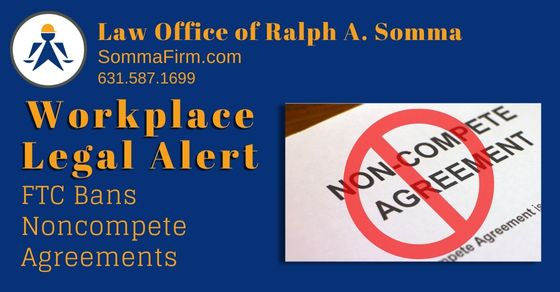On April 23, 2024, the United States Federal Trade Commission announced a new rule banning non-compete agreements. The rule is effective September 4, 2024.
While previous enforcement of non-compete provisions was governed by varying state laws, the new FTC rule bans both existing and future noncompetes with workers nationwide. “Worker” includes employees, independent contractors, externs, interns, volunteers or apprentices. There’s an exception for non-competes entered into before the rule’s effective date with “senior executives” – president, chief executive officer or the equivalent – earning more than $151,164 annually who are in policy making positions. After the rule’s effective date, new senior executive non-competes are also banned. The law also doesn’t apply to pending non-compete lawsuits.
Employers must provide written notice, on or before the rule’s effective date, to current and former workers (other than the excepted “senior executives”) who are parties to a non-compete that it will not seek to enforce any noncompete agreements against them. The FTC published a model notice which you can download here.
The new rule allows for noncompete agreements covering the sale of a business or an ownership interest. Also, customer/employee non-solicit and non-disclosure agreements remain valid provided they do not have the effect of preventing worker mobility (determined on a case-by-case basis).
Additionally, the rule recognizes that the FTC’s jurisdiction generally does not cover non-profit organizations. Nonetheless, the rule explains that even nonprofit organizations with IRS 501(c)(3) tax-exempt status “are not categorically beyond the Commission’s jurisdiction” and the FTC could challenge whether a nonprofit is in fact a profit-making enterprise within the FTC’s jurisdiction and therefore subject to the rule. It is worth noting that the FTC seems particularly concerned with non-competes in health care organizations, many of which operate as nonprofits.
Not surprisingly, shortly after the rule was announced, several lawsuits were filed challenging it. An injunction stalling the enforcement of the rule will likely issue from one or more such suits. We will monitor developments and provide updates.
To print this blog post click here.

About the Author: Ralph A. Somma
Ralph A. Somma is an experienced employment lawyer from Long Island, New York who has been practicing labor & employment law exclusively for over 30 years.
Call today (631) 587-1699 or click here to schedule a FREE telephone consultation.


Recent Comments